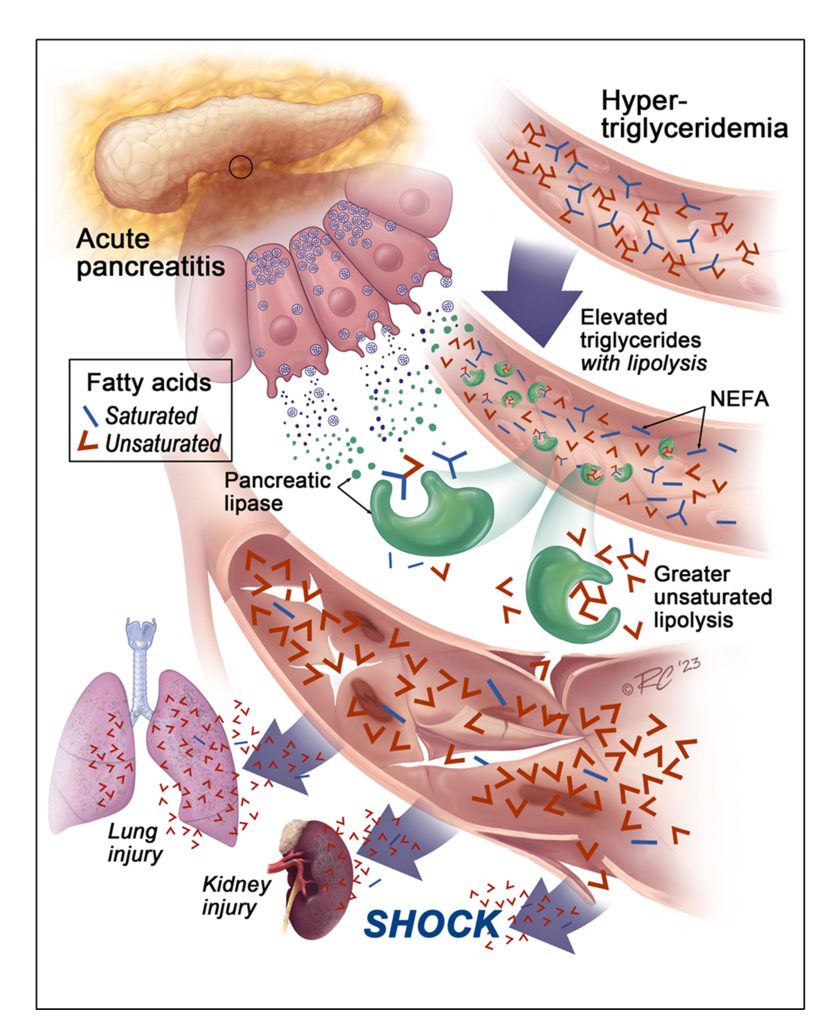-
Research
Discovery reveals how to prevent organ damage in pancreatitis
Researchers at Mayo Clinic have discovered how high levels of triglycerides, a type of fat found in the bloodstream, can rapidly damage organs during acute pancreatitis. They discovered in pancreatitis that circulating triglycerides swiftly break down into smaller building blocks known as fatty acids that can damage organs such as the lung and kidneys. Blocking this breakdown prevented such damage from occurring.
The findings, published in the Journal of Clinical Investigation, open a new therapeutic avenue for treating pancreatitis by halting the breakdown of triglycerides.

"This discovery not only provides a deeper understanding of the mechanisms behind triglyceride-induced organ damage in pancreatitis but also offers a promising strategy to improve patient outcomes," says senior author Vijay Singh, M.D., a gastroenterologist at Mayo Clinic's campus in Scottsdale, Arizona.
Acute pancreatitis is a common gastrointestinal disorder that leads to approximately 275,000 hospital admissions annually in the U.S. alone. An estimated 30% of patients with acute pancreatitis have a form of the disease marked by high levels of triglycerides.
Patients with hypertriglyceridemia-associated acute pancreatitis have a higher risk of persistent organ failure and severe pancreatitis, which often requires life support, prolongs hospitalization and increases mortality rates. Despite these severe outcomes, the mechanisms driving this form of acute pancreatitis have remained unclear until now.
In this study, the researchers analyzed triglyceride and fatty acid levels in blood samples from 269 patients with acute pancreatitis. They found that patients with very high triglycerides had more severe disease and higher levels of fatty acids.
In addition, they did experiments in preclinical models to see how metabolizing triglycerides into fatty acids affected organ health. In animals, this process led to organ failure, which could be prevented by blocking an enzyme called lipase, which plays a crucial role in triglyceride metabolism.

The finding could inform new ways to manage triglyceride elevation during pancreatitis. Current treatments, such as the use of the blood thinner heparin to reduce triglycerides, have shown minimal benefit in reducing organ damage or the severity of pancreatitis. Heparin works by breaking down triglycerides, but this process does not significantly improve patient outcomes.
Mayo Clinic researchers, led by Dr. Singh, are currently developing alternative therapies for acute pancreatitis that block the breakdown of triglycerides.
The recent study also sheds light on the implications of using heparin and other treatments that release the enzyme lipase. It found that the worst outcomes were observed in pancreatitis patients receiving nutrition via IV, as intravenous formulations containing triglycerides can be broken down to potentially harmful fatty acids by circulating lipases.
The research team is now investigating the relevance of this finding in patients with elevated lipase levels due to other diseases, such as intestinal, heart and lung conditions. These diseases may silently damage the pancreas, causing it to leak lipase and create a vicious cycle of worsening organ damage.
"Preliminary studies suggest that patients with elevated triglycerides and lipase levels require more frequent admissions to the intensive care unit," says Dr. Singh. "If confirmed, these findings could point to new ways to prevent the progression of these diseases."
Review the paper for a complete list of authors, disclosures and funding.







